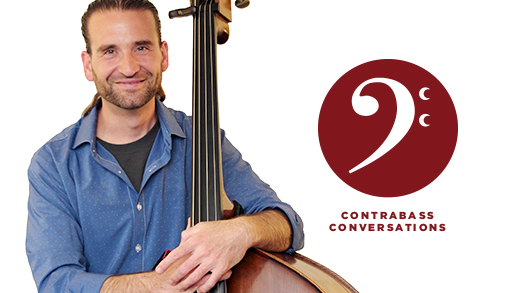Today’s podcast features an in-depth conversation with Peter Tambroni. This is a “round two” conversation that builds upon the topics that we covered in our previous talk on episode 204. Today we dig into fallacies surrounding public school teaching, instrument setup, life planning, instrument insurance, practicing ideas, teaching philosophies, and much more. This episode is a gold mine for anyone interested in taking their teaching game to the next level!
Pete is the author of An Introduction to Bass Playing, which is now in its seventh edition, and is an active bass performer, teacher, and author. You can learn more about Pete on his website petertambroni.com.
Interview Highlights
Fallacies Surrounding Public School Teaching
-
- you don’t want to get too well-educated or you won’t be hired
- Pete has never found that to be true in the various districts in which he has worked
- everyone wants the best person for the position
- most districts will do what they can to give you credit for your past experience
- the right person for the job is the right person or the department philosophy-wise and personality-wise
- people tend to focus too much on the nitty-gritty skills – it’s more about fit than anything
- you should be interviewing them as much as they are interviewing you
- you don’t want to get too well-educated or you won’t be hired
- replacing people that are:
- good and well-liked
- good and not well-liked
- not good and well-liked
- not good and not well-liked
- Skills are easy to teach – personality and philosophy are not
- people tend to not ask enough questions in job interviews
- Pete always want to be somewhere where the administration supported fine arts performers practicing their craft – this was a question he posed in his interviews
- look at the distribution of music teacher positions – are people full-time orchestra, part orchestra and part general music, etc?
- what degree does fundraising play in the school? this can turn into a nightmare
- learning the other instruments as a music teacher
- Pete took two extra semesters of violin and viola
- music ed programs are not all requiring bass for music ed majors
Instrument Setup
- the condition that many school basses are in – so easy to totally neglect them
- a bass with action that is too high is a catastrophically worse situation for a young player than a violin with action too high
- setup considerations for school instruments
- fingerboard
- bridge shaping
- the need for a proper luthier
- the extreme difficulty created for younger bass students by basses that are poorly set up
- the advances that D’Addario has made in strings recently for students
Life Planning
- investing vs. saving
- index funds
- Apps and programs
- Betterment
- Wealthfront
- Robin Hood
- IRAs
- Roth IRAs
- 403b investment programs for educators
Instrument Insurance
- get a separate policy apart from your homeowners or renters insurance – these may not cover your instrument at a paying gig
- Clairon
- Merz-Huber
Practicing Ideas
- teaching replacement fingerings
- the challenge for bass players of heterogeneous string teaching (starting in D major, for example)
- nothing beats Simandl for mapping out the fingerboard
- Thomas Gale’s book Practical Studies for Double Bass is great for younger students
- starts in 1st and 4th positions – allows for physical anchor point of thumb against the neck block
- helps eliminate the “old-school bass vertigo”
- teaching shifting
- finding the goal note should not be a fishing expedition!
- Mathias Wexler article about shifting in American String Teacher journal: “Throwing The Dart and Other Reflections on Intonation” from the November 2004 issue of American String Teacher.
- this is a link to the shifting exercise Pete describes
- shifting practice
- play
- stop
- evaluate
- play correct note if not in tune
- repeat above procedure until shift lands right on
General Teaching Philosophies
- try to teach for 10 years down the road
- try to teach for the student’s next teacher
- set people up so that things don’t need to be fixed in the future
- having students nail a simpler piece versus struggle through a more difficult piece
- empathizing with your students
- don’t ask questions to “put students in their place”
- it’s never strings versus band versus choir – though there are doubles, there are “string kids,” “choir kids,” and “band kids” – offering all programs brings music to a larger portion of the student body
- we remember the emotion of experiences – emotion drives attention drives learning
How Gigging Helps You to be a Better Teacher
- helps with empathy
- opportunity to observe other players
- opportunity to observe conductors
- being respectful of the student’s time
Listener Feedback Links:
- Pablo Aslan – tango bassist
- lloydgoldstein.com

